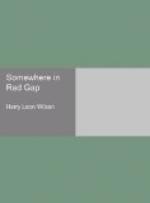THE RED SPLASH OF ROMANCE
The walls of the big living-room in the Arrowhead ranch house are tastefully enlivened here and there with artistic spoils of the owner, Mrs. Lysander John Pettengill. There are family portraits in crayon, photo-engravings of noble beasts clipped from the Breeder’s Gazette, an etched cathedral or two, a stuffed and varnished trout of such size that no one would otherwise have believed in it, a print in three colours of a St. Bernard dog with a marked facial resemblance to the late William E. Gladstone, and a triumph of architectural perspective revealing two sides of the Pettengill block, corner of Fourth and Main streets, Red Gap, made vivacious by a bearded fop on horseback who doffs his silk hat to a couple of overdressed ladies with parasols in a passing victoria.
And there is the photograph of the fat man. He is very large—both high and wide. He has filled the lens and now compels the eye. His broad face beams a friendly interest. His moustache is a flourishing, uncurbed, riotous growth above his billowy chin.
The checked coat, held recklessly aside by a hand on each hip, reveals an incredible expanse of waistcoat, the pattern of which raves horribly. From pocket to pocket of this gaudy shield curves a watch chain of massive links—nearly a yard of it, one guesses.
Often I have glanced at this noisy thing tacked to the wall, entranced by the simple width of the man. Now on a late afternoon I loitered before it while my hostess changed from riding breeches to the gown of lavender and lace in which she elects to drink tea after a day’s hard work along the valleys of the Arrowhead. And for the first time I observed a line of writing beneath the portrait, the writing of my hostess, a rough, downright, plain fashion of script: “Reading from left to right—Mr. Ben Sutton, Popular Society Favourite of Nome, Alaska.”
“Reading from left to right!” Here was the intent facetious. And Ma Pettengill is never idly facetious. Always, as the advertisements say, “There’s a reason!” And now, also for the first time, I noticed some printed verses on a sheet of thickish yellow paper tacked to the wall close beside the photograph—so close that I somehow divined an intimate relationship between the two. With difficulty removing my gaze from the gentleman who should be read from left to right, I scanned these verses:
Song of the open road
A child of the road—a
gypsy I—
My path o’er
the land and sea;
With the fire of youth I warm
my nights
And my days are
wild and free.
Then ho! for the wild, the
open road!
Afar from the
haunts of men.
The woods and the hills for
my spirit untamed—
I’m away
to mountain and glen.
If ever I tried to leave my
hills
To abide in the
cramped haunts of men,
The urge of the wild to her
wayward child
Would drag me
to freedom again.




